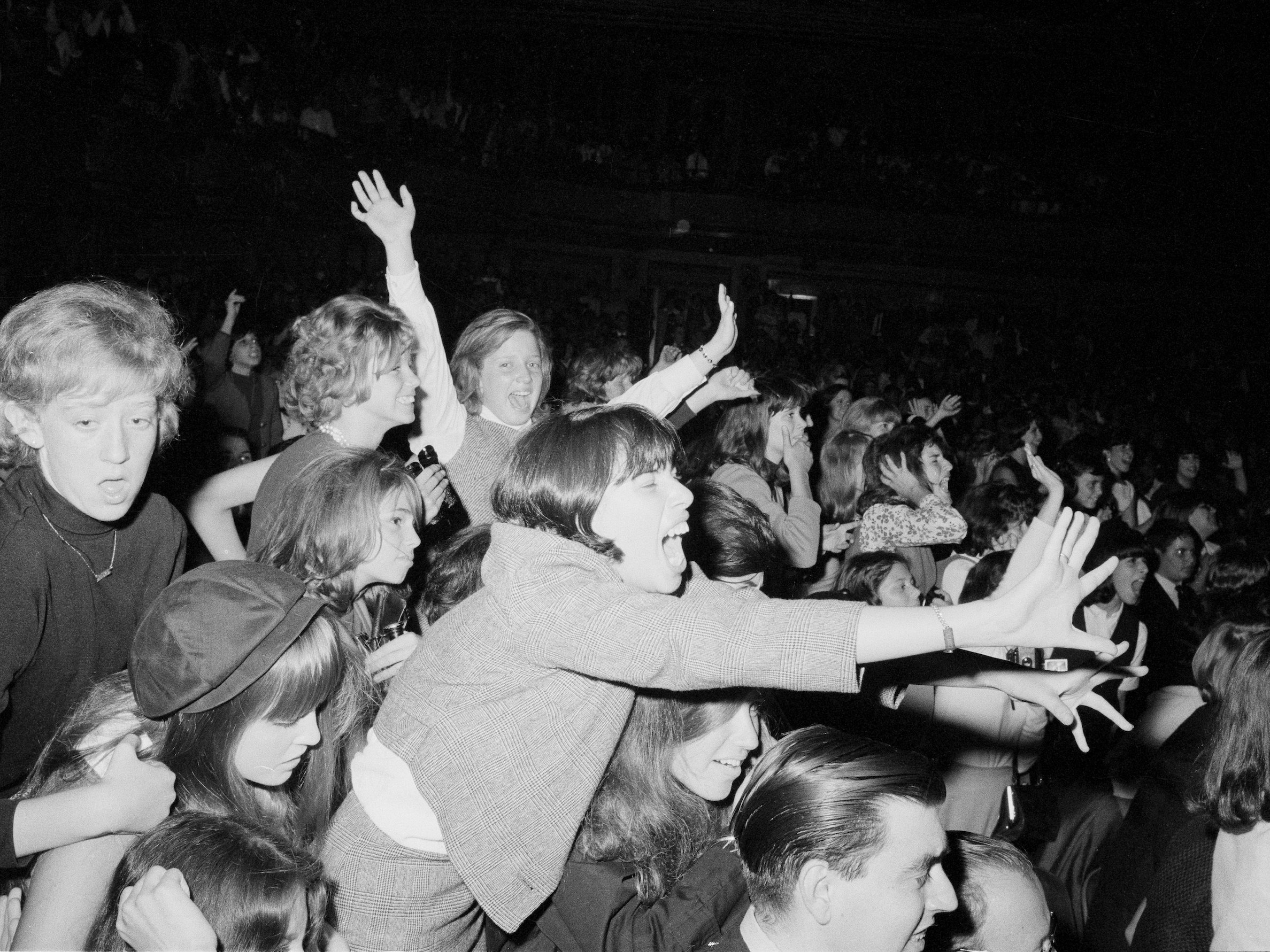- Teen girls wield a large amount of cultural capital, often determining which brands and celebrities become popular.
- Cultural phenomena like The Beatles and Harry Styles all had teenage girls to thank for their initial popularity, and huge brands like Nike and Ulta count teen girls as some of their biggest customers.
- But when their interests don’t align with what the rest of the world tells them is valuable, they’re often mocked.
- That kind of disrespect can take a toll, as I discovered when I was a teenager and even into my adult years.
- Visit Insider’s homepage for more stories.
One of the best things I’ve ever written was a college paper on “Twilight” and “The Hunger Games.” Unsurprisingly, my professor – who later turned out to be my favorite teacher of all time – was skeptical when I told him what I wanted to write. He thought of these books as silly tales for kids, with not much to offer in the way of sophisticated literary trappings. I found myself arguing not only for my thesis, but for the necessity of the essay at all.
Young-adult books usually aren’t accepted as capital-L literature, particularly when the story features a female protagonist. They’re not written for adults or boys, so they’re often written off as frivolous and superficial.
 Foto: “Twilight” helped to launch Robert Pattinson’s career.sourceSummit Entertainment
Foto: “Twilight” helped to launch Robert Pattinson’s career.sourceSummit Entertainment
The interests of teenage girls are often trivialized, no matter what they happen to be into at the time
Defending these books gave me a frustrating sense of déjà vu, as it wasn’t the first time – nor would it be the last – my teenage interests were written off by an adult man. I was mocked throughout my teenage years for the books I read and the music I listened to by my male peers and the adults around me.
I was recently reminded of this when VSCO girls became a meme in late 2019. Sunkissed, pretty, and adorned in scrunchies, the group, named for the photo app, were the latest iteration of teenage-girl cool for a largely wealthy and white demographic.
Of course, once something gains that much momentum, it often becomes ripe for mockery. A quick search for "VSCO girls" on Twitter will show you thousands of memes making fun of everything from the T-shirts they wear to the way they talk. To be fair, VSCO girls can feel a bit ridiculous - no one needs that many selfies in their driveway - but the criticism sometimes felt gendered.

Back in 2014, the target was "Brandy girls," a nickname for teenage girls who dressed a certain way. (The "Brandy" stood for the clothing brand Brandy Melville, which as it happens is a go-to for VSCO girls today.) Before that, there were Twi-hards, One Directioners, and girls who tried to dress just like Blair Waldorf from "Gossip Girl." Each group was ridiculed, underscoring the fact that it didn't matter what the teenage girl loved - she'd be mocked for it anyway.
This isn't unique to teenagers. Women, particularly women of color, aren't taken seriously, no matter what age they are - they're undermined at work, in the doctor's office, at home, and in policy debates over what happens to their bodies. But the problem is particularly acute when girls are young.
It's curious, because adolescent girls often directly influence which products, people, and brands become popular

Though current instances are abundant, the classic cultural example of the teen-girl influence is The Beatles. Today, the quartet is one of the most beloved musical groups of all time. But when The Beatles first gained popularity in the 1960s, teenage girls made up the vast majority of their fans.
https://twitter.com/iknownaama/status/1186234151458033664?ref_src=twsrc%5Etfw
Adolescent girls shrieked and fainted when The Beatles sang, while their parents scratched their heads and their male counterparts pretended not to be interested, all the while growing their mop-tops.
Their adoration became known as Beatlemania, giving the world one of its earliest glimpses of what today we call fandom. But this early popularity is overshadowed by the group's later fame among self-proclaimed music aficionados.
You can see the pattern continue with stars like Harry Styles or Robert Pattinson today.
anyways funny how teenage girl fans are the most criticized and derided when theyre some of the most powerful trendsetters when it comes to pop culture. you lock down a strong fanbase of young women and youre pretty much guaranteed years of loyal support.
— kat ☀️ (@saItkath) April 27, 2019
Styles was once just a member of the boy band One Direction, beloved only by female teens and tweens when he entered the public scene in 2010. But by 2017 he set the record for best-selling first week for an album by a British male artist, and he's become a global fashion icon, serving as a cochair of the 2019 Met Gala.
Likewise, Robert Pattinson was written off as a nonserious actor after he starred as Edward Cullen in the "Twilight Saga" film adaptations. But his recent roles in Netflix's "The King" and "The Lighthouse," as well as his casting as Batman, indicate he's gone from teen heartthrob to full-on Hollywood star.

On the economic side, teen spending can help dictate which brands are successful
Nike, for example, is one of the largest fashion brands in the world. According to Piper Jaffray's most recent survey on teen spending behavior, it's also the top apparel destination for Generation Z. (While the survey includes responses from across the gender spectrum, data suggests clothing is the biggest spending category for girls.)
Likewise, Ulta was the demographic's favorite beauty store, with 38% of the respondents choosing it as their No. 1 beauty retailer - a fact that has most likely helped it thrive in a difficult market.
Teen girls also helped Kylie Jenner's cosmetics empire grow into a behemoth, and Forbes recently named her the youngest self-made billionaire ever. (You can argue about whether she's actually self-made, but you can't argue that she has tons and tons of cash.) Jenner's success and the teen market's affinity for her aren't a coincidence - the makeup mogul intentionally targeted teenagers with her products, as Entrepreneur points out.
It makes sense: Once you hook a teen, particularly fashion mavens like teen girls, you hook them as they grow into independent adults with even greater spending power. They're an incredibly lucrative demographic, and their preferences matter. Businesses love the teenage girl when she's spending her valuable money on the products they make, wielding her cultural influence for capitalist consumption.
But corporate love for teenage girls disappears when she harnesses that power for her own purposes
Greta Thunberg uses her voice to directly target corporations and leaders who refuse to act on climate change. They're certainly not lining up to pay her millions of dollars - indeed, many of them would prefer her to vanish. She's constantly vilified for her efforts, painted as a petulant child by the media and world leaders four times her age. Emma Gonzalez, the Parkland, Florida, shooting survivor and March For Our Lives founder, experienced similar treatment as she advocated gun control.

But even if adolescent girls aren't using every waking moment to fight for climate change, they still don't deserve to be ridiculed for what they like.
Teenage girls are human beings who matter, and dismissing their interests can have a lasting impact
I'm long past my teenage years, but I still hesitate when people ask me what kind of music I like, usually answering with "I don't know much about it." But that's not true - I love pop music, and I could sing you any song by Taylor Swift, Ariana Grande, Lizzo, or Zara Larsson.
Years of being criticized for my "basic" taste in music made me feel embarrassed, while nearly every man I've gone out with thinks he's a musical genius for knowing every lyric on a Radiohead, AC/DC, or Kanye West album.

Insults and jokes can shape the way society views teenage girls and how they view themselves. Constantly belittling their interests reinforces the message that they don't matter and that their needs are inherently lesser, feeding into the system that dismisses women in every arena.
My professor let me write the "Twilight" essay because he could tell I felt strongly about it. I got an A on the paper, and it even got published in my school's academic journal later that year. Knowing there was space for me to write about the things that interested me led me to major in English, which is how I was able to pursue a career in media. I'm not sure I would have ended up where I am if that professor hadn't taken my teenage interests seriously. Imagine if every other young woman were given the same opportunity.
- Read more:
- The summer of the 'VSCO girl' may be long over, but retailers and the VSCO app itself still reap the benefits of the craze that swept Gen Z
- I'm a millennial, and I don't hate the VSCO girl - she's just the first new trend that makes me feel old
- The changing ways teens are using the internet that older people don't understand
- Chick-fil-A leads the pack as teens' favorite restaurant chain in America

